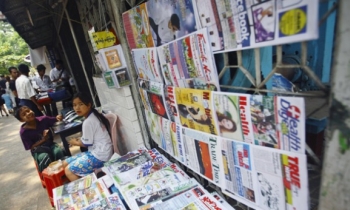Press freedom groups have condemned the killing of a reporter in Assam's Kokrajhar district and urged the Indian government to ensure the safety of journalists working in conflict zones in the Northeast.
"The police in Assam must thoroughly and transparently investigate Jagjit Saikia's killing," said Bob Dietz, Asia Programme Coordinator of the New York-based Committee to Protect Journalists (CPJ). "Local governments in (India's) Northeast should make journalists' security a priority to enable publication of essential news about local conflicts."
"The security situation is very worrying in the northeast," Paris-based Reporters sans Frontières (RSF) said in a statement. "It is unacceptable that journalists should be made to pay for refusing to relay propaganda for the different parties to a conflict. This latest murder must not go unpunished. We call on the authorities in New Delhi to order the Central Bureau of Investigation (CBI) to carry out an exhaustive investigation to determine the motives and arrest those responsible."
Jagajit Saikia (35), the Kokrajhar district local correspondent of the Guwahati-based daily Amar Asom, was on Saturday last shot at near a pharmacy in the heart of Kokrajhar town, official sources said. The gunmen fired six rounds. Saikia was immediately rushed to the Rupnath Brahma Civil Hospital in Kokrajhar where he succumbed to his injuries. Saikia is survived by his wife and a minor child.
Saikia was the second journalist to be killed in the Northeast this week. On November 17, unidentified men shot dead Konsam Rishikanta Singh, a trainee sub-editor of the Imphal Free Press, an English daily from Manipur.
Local journalists said Saikia may have been killed because of his reporting. Saikia frequently about internecine clashes between different Bodo groups. The militant National Democratic Front of Boroland (NDFB), which signed a ceasefire agreement with the Indian government in 2005, has denied any role in Saikia's killing.
Meanwhile, the Journalists Action Committee, Assam (JAC) has urged President Pratibha Patil to ensure that the government provides security to journalists working in the region. In a letter to Patil, the JAC President Sanjib Phukan and Secretary Prakash Mahanta said, "You must be aware of the fact that ours is a conflict-ridden zone, where the media fraternity plays a very important role in upholding democratic values. Unfortunately, in doing so, the journalists become targets of anti-social elements from time to time.
"At least 20 journalists were killed in the last 17 years. And surprisingly, not a single perpetrator of these heinous crimes was booked under the law. Most journalists working in this conflict-ravaged state enjoy no protection under any insurance cover. We feel that it is the duty of the government to ensure the safety of these sentinels of the society."









